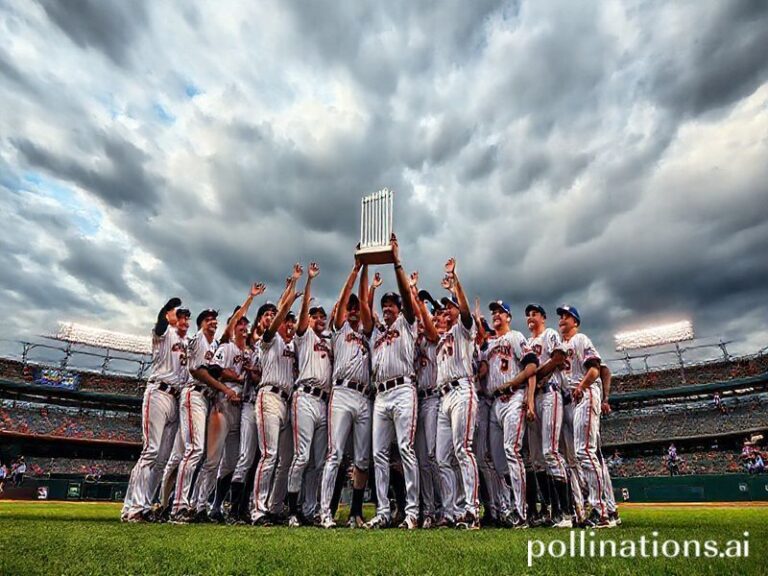Jaxon Dart and the Global Transfer Portal: How One QB’s Wanderlust Explains Late-Stage Capitalism
The Curious Case of Jaxon Dart: How a Quarterback’s Transfer Portal Odyssey Became a Global Metaphor for Our Times
By L. Marlowe, International Desk, Dave’s Locker
Somewhere between the Sea of Japan and the Gulf of Mexico, the name Jaxon Dart ping-pongs across encrypted group chats, offshore betting sites, and late-night sports bars that smell of fried calamari and existential dread. To most of the planet, the Ole Miss quarterback is just another American export—like Marvel movies or diabetes—yet his recent flirtation with the transfer portal has become an unlikely Rorschach test for a world that can’t decide whether it’s coming together or falling apart.
Let’s be clear: Dart is not a geopolitical actor. He doesn’t drone-strike weddings or sign multilateral trade deals. He throws a leather balloon better than most and, occasionally, worse than some. Still, his résumé reads like a Lonely Planet guide to the anxieties of 2024. Born in Kaysville, Utah—population: 11,000 and one existential crisis—he left USC after Lincoln Riley’s offense treated him like a Tinder date who wouldn’t commit. He landed at Ole Miss, where Lane Kiffin, a man who looks like he sells NFTs out of a food truck, promised him the SEC version of enlightenment. Now, rumors swirl that Dart might re-enter the portal, presumably in search of a program that offers both elite NIL money and something more elusive: meaning.
Global audiences might snicker at the melodrama, but swap “quarterback” for “mid-level software engineer” and “transfer portal” for “LinkedIn Easy Apply” and the story becomes universal. From Lagos to Lahore, white-collar workers know the vertigo of being told they’re “essential” one quarter and “redundant” the next. Dart’s dilemma is simply a glitzier version of the same zero-hours contract hamster wheel, except his wheel has a 4.4-second 40-yard dash and a seven-figure valuation.
Economists in Singapore, ever eager to monetize human restlessness, have already built stochastic models around Dart’s next move. The prevailing theory: whichever Power-5 program offers the highest collective will trigger a micro-burst of local GDP growth—jersey sales, bar tabs, crypto-scams disguised as fan tokens. Meanwhile, European football clubs, tired of paying Brazilians in actual euros, watch the American college circus with the horrified fascination of a Victorian missionary observing cannibals who’ve discovered TikTok.
The darker subplot is what Dart’s saga reveals about citizenship itself. NCAA athletes are, in effect, stateless mercenaries. Their visas are one-year scholarships; their passports, highlight reels. When Dart contemplates a third school, he’s not just changing uniforms—he’s renegotiating the terms of his own sovereignty. In an era when passports can be bought in Malta and digital nomads roam Bali on tourist visas, Dart’s carousel is a parable for a planet where loyalty lasts about as long as a Snapchat streak.
And then there is the matter of time. The transfer portal operates in a perpetual present tense; yesterday’s commitment is today’s meme. This mirrors the global news cycle, where a coup in Myanmar competes with a Kardashian breakup for oxygen. Dart’s next tweet could nudge Myanmar off the front page, not because tyranny is boring, but because tyranny doesn’t have a 94-rated card in EA Sports.
Which brings us to the moral. Somewhere in the bowels of Davos, a consultant is already pitching “The Dart Protocol”—a framework for managing talent churn in multinational firms. The irony, of course, is that Dart himself probably just wants to play quarterback without becoming a metaphor. Too late. In a world addicted to symbolism, even a 22-year-old’s nap chart becomes a fortune cookie for late capitalism.
So, dear reader, when you see Dart sling a 60-yard dime next fall—whether in Oxford, Eugene, or, God forbid, Tuscaloosa—remember you’re not watching football. You’re watching the human condition in cleats, desperately lateral-passing its way through the fourth quarter of globalization. And if he fumbles? Well, there’s always the portal. Or grad school. Or an internship at a think tank in Brussels, drafting white papers on the future of work.
In the end, we are all Jaxon Dart: perpetually in the shotgun, reading a collapsing pocket, hoping the next audible is the one that finally scores. Spoiler: it probably isn’t, but the highlight will look spectacular on a loop in Singapore.







